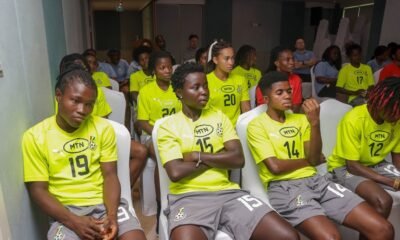News
Africa CDC Director General pays courtesy call on Minister of Health

The Director-General of the Africa Centres for Disease Control and Prevention (Africa CDC), Dr. Jean Kaseya, has paid a courtesy call on the Minister of Health, Kwabena Mintah Akandoh, to sign a data-sharing agreement between Ghana and Africa CDC.
During the meeting, Mr. Akandoh stated that Ghana’s Health Security Bill is ready and will soon be presented to Cabinet and Parliament for approval.
The bill is part of the country’s broader efforts to strengthen national health resilience.
The Minister also reaffirmed Ghana’s commitment to Primary Health Care (PHC), noting that it has a flagship program aimed at achieving Universal Health Coverage (UHC). He emphasized that financial barriers often hinder access to health services, and the rollout of free primary health care would serve as a major catalyst in accelerating Ghana’s path toward UHC.
Mr. Akandoh praised Africa CDC’s continued support to Ghana, highlighting several key contributions. He called for sustainable financing models to close the healthcare funding gap, urging African nations to “think outside the box” and take ownership of their health systems.
“Africa must take its destiny into its own hands,” he stated, expressing hope that the Director-General’s visit would help prioritize these concerns.
In his remarks, Dr. Jean Kaseya highlighted Africa’s over-reliance on imported medical solutions.
“We don’t produce our own vaccines or medicines for diseases like Ebola, Marburg, and cholera. That has to change,” he said.
Dr. Kaseya also hinted at an upcoming summit involving 19 Heads of State, which will focus on challenges in local pharmaceutical manufacturing and access to health technologies.
He urged African nations to move beyond dependence on foreign aid and invest in their medical solutions, stressing the importance of innovation, investment, and strong leadership.
“When you combine conflict, poor funding, and weak systems, you build the foundation of another pandemic,” he warned. “This is our opportunity to change course.”
In closing, Dr. Kaseya reaffirmed the shared commitment to continue working together to build a stronger, self-reliant health sector for Ghana and the African continent.
News
Man sentenced to 25 years for robbery at Manso Akwasiso

A 30-year-old man has been sentenced to 25 years imprisonment with hard labour by the Bekwai Circuit Court for his role in a 2022 robbery at a mining site at Manso Akwasiso in the Ashanti South Region.
The convict, Dominic Ofori, also known as Fanta, was arrested on 16th February 2026 after years on the run. He pleaded guilty before the Bekwai Circuit Court to robbery contrary to Section 149 of the Criminal Offences Act, 1960 Act 29, and was accordingly sentenced to 25 years imprisonment with hard labour.
On March 20, 2022, the Manso Adubia District Police received intelligence that a group of armed men from Manso Abodom were planning to attack a mining site at Manso Akwasiso to rob the owner of gold concentrate. Acting on the information, police mounted a coordinated operation and laid an ambush at the site.
At about 5:30 pm the same day, four-armed men arrived at the site, fired indiscriminately, and robbed the miners of their gold concentrate. The police team on surveillance intervened, resulting in an exchange of gunfire.
Three of the suspects, Abu Abubakar, Musah Latif, and Gideon Takyi, sustained gunshot wounds and were pronounced dead on arrival at St Martins Catholic Hospital at Agroyesum. Dominic Ofori escaped at the time but was later arrested and put before the court.
The Ashanti South Regional Police Command has assured the public of its continued commitment to combating violent crimes and bringing offenders to justice.
News
Ashanti police arrest man for publishing false news on TikTok

The Ashanti Regional Police Command has arrested 45-year-old Isaac Boafo, also known as “Duabo King,” for allegedly publishing false news intended to cause fear and panic.
Police said the arrest follows a viral TikTok video in which Boafo claimed that four officers at the Central Police Station in Kumasi engaged in inappropriate conduct with commercial sex workers during night patrols in Asafo.
Officers from the Police Intelligence Directorate (Ashanti Region) apprehended Boafo after receiving intelligence about the video.
During questioning, he admitted to creating the video to attract views and engagement online, and acknowledged that he could not prove the allegations.
Boafo also admitted making comments about the President of the Republic for content purposes and could not defend those statements.
He has been formally charged and is in detention as investigations continue.
The Ashanti Regional Police have warned the public against publishing or sharing false information on social media, noting that such acts can cause fear, panic, and damage reputations.
They said anyone found engaging in similar conduct will face legal action.
By: Jacob Aggrey














